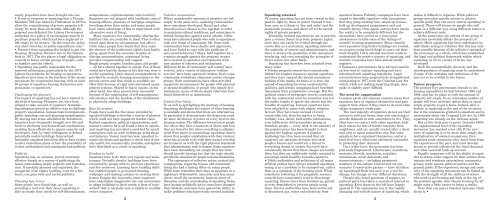wates-wolmar-squatting-real-story
wates-wolmar-squatting-real-story
wates-wolmar-squatting-real-story
- No tags were found...
Create successful ePaper yourself
Turn your PDF publications into a flip-book with our unique Google optimized e-Paper software.
empty properties have been brought into use.• It was in response to <strong>squatting</strong> that a PrivateMembers’ Bill was tabled in Parliament in 1976 toallow the requisitioning of private property leftempty for more than six months. Although theproposal was defeated, the Labour Governmentembarked on a policy of encouraging councils topurchase property which had been neglected orleft empty by its owners. 3 (In the event the policywas short-lived due to public expenditure cuts.)• Pressure from <strong>squatting</strong> also helped to put theHousing (Homeless Persons) Act on the Statutebook in 1977. The Act places a legal obligation oncouncils to house certain groups of people, suchas families and the elderly.• Squatting was partly responsible for therenewed enthusiasm, particularly by the 1974Labour Government, for housing co-operatives.Squatters have been in the forefront of the recentmovement for co-operative housing, with at least50 groups of squatters forming themselves intopermanent co-operatives. 4Challenging the plannersThe impact of <strong>squatting</strong> has not been limited tothe field of housing. Planners, too, have beenobliged to take account of squatters’ demands.Squatting has proved an effective way to challengeproperty speculation, bureaucratic incompetence,public spending cuts and planning megalomania.By moving into areas scheduled for demolition,squatters have frequently brought new life andheart to declining and demoralised communities,enabling them effectively to oppose councils anddevelopers. And, by their willingness to defendpotentially usable buildings from behindbarricades, squatters have been able to force ownersto alter demolition plans or face the possibility ofviolent confrontation and consequent bad publicity.PublicitySquatting has, on occasion, proved extremelyeffective simply as a means of publicising theissues surrounding empty property and homelessness.If carefully planned and organised, theoccupation of an empty building, even for a fewhours, can gain wide and useful publicity.Choosing how to liveSome people have found that, as well asproviding a roof over their head, <strong>squatting</strong> isable to satisfy their needs for self-determination,independence, experimentation and creativity.Squatters are not plagued with landlords, councilhousing officers, planners or mortgage companiesbreathing down their necks, and many peoplehave taken advantage of this to experiment withalternative ways of living.Many squatters live communally, sharing thefacilities that are available to them. This is oftenforced upon them by circumstance, but after awhile many people have found that they enjoythe absence of the traditional, tightly-knit familygroup. Apart from the economic benefits ofsharing accommodation, communal livingprovides companionship and support.Single people, couples, families, gays, old people— all have shared together in squats. Few of themwould have had the chance to live this way were itnot for <strong>squatting</strong>. Little shared accommodation isprovided by councils, housing associations or theprivate sector, and that which is available toooften fails because of rigid and centralised managementsystems. Shared living in squats, on theother hand, has often proved more successfulbecause of the combination of self-management,self-selection and the freedom of the inhabitantsto physically adapt buildings.Base for projectsPeople have used the free space provided bysquatted buildings to develop a variety of projectswhich could not have supported market rents.Radical magazines, political organisations, andwomen’s centres have all found a base in squats,and <strong>squatting</strong> has provided a seed-bed for smallenterprises such as craft workshops, print shopsand bakeries. Vacant land has been squatted tocreate city farms and gardens; a whole host of sociallyuseful, but commercially unviable, enterpriseshave flourished as a result of <strong>squatting</strong>.Freedom to buildSquatters have to do their own repairs and maintenance.Virtually derelict buildings have beenrenovated by people with no previous experienceand few resources. Learning basic building skillshas enabled people to go beyond choosingwallpaper and making curtains in creating theirhomes. Despite the insecurity, some squattershave undertaken imaginative low-cost conversionsto adapt buildings to their needs, a form of ‘usercontrol’that is normally only available to wealthyowner occupiers.Cohesive communitiesWhere considerable amounts of property are leftempty in the same area, <strong>squatting</strong> communitieshave sometimes developed. Racial and otherminorities have chosen to live together in orderto maintain cultural traditions, and sometimes todefend themselves against racial attacks. Otherareas have attracted people who wish to experimentwith new forms of community life. Some suchcommunities have been chaotic and oppressive,and have failed to cope with the problems ofanti-social behaviour. Others, held together by acommon struggle against the property ownershave created co-operative environments withrare quakes of cohesion and enthusiasm.Different forms of community ‘self control’ haveevolved, and a variety of alternative ‘welfareservices’ have been spawned: crèches, food co-ops,community workshops, claimants unions, therapygroups. Such communities have often providedsupportive environments for people with physicalor mental disabilities, or people who simply feelinadequate, many of whom might otherwise havefound themselves in institutions.Control from belowSo as well as spotlighting the shortage of housing,Squatting challenges the nature of what housingis available and shows that there are alternatives.In particular it demonstrates the desperate needfor more devolution of power at every level in thehousing system. The difference between how peoplelive when they have a measure of choice and howthey are forced to live when everything is administeredfrom above is astonishing; <strong>squatting</strong> clearlyshows that people’s satisfaction with their environmenthas as much to do with their control over thatenvironment as with the rigid physical standardsthat administrators seek to impose. Some squattershave been demanding not simply that the stateshould provide housing but that the state shouldprovide the resources for people to house themselves.The experience of collective action, mutual aid,campaigning, repairing houses and communalliving has had a lasting effect on many people.While some remember their days as squatters as anightmare of discomfort, insecurity and fear, manyothers recall the excitement, humour, sense ofliberation and the comradeship of <strong>squatting</strong>. Somehave become politically active, some have changedtheir lifestyle, and some have gained the ability totackle problems which previously seemed insoluble.Squatting attackedOf course, <strong>squatting</strong> has not been viewed in thispositive light by those in power. Instead it hasbeen seen as a threat to ‘law and order’ and thedemocratic process, and above all to the sacredrights of private property.Ironically, isolated squatters do not in practicepose a serious threat to private property rights,since they can easily be evicted through thecourts. But as a movement, <strong>squatting</strong> subvertsthe authority of owners and administrators, andthere is always the possibility of the movementescalating, and even extending the principles ofdirect action into other fields.Squatting has therefore been attacked frommany sides.• Private property owners have consistentlylobbied for tougher measures against squatters,and they have enjoyed the almost unanimousbacking of the media. At times, it is true, thespread of <strong>squatting</strong> has been accelerated bypublicity, and certain campaigns have benefitedimmensely from sympathetic coverage. But thepolitical stance of newspaper owners, combinedwith the commercial need for sensation, has ledthe media largely to ignore the causes and thebenefits of <strong>squatting</strong>. Instead, squatters havebeen attacked at times with almost religiousfervour. They have been accused of everyconceivable evil, from having lice to beingworkshy. Lies, deceit, half-truths, fabrications,even infiltration with journalists posing ashomeless people — every trick in the armoury ofthe popular press has been brought to bearagainst the hapless squatter. A popularmythology has thus been created that allsquatters are parasitic deviants who stealpeople’s houses and constitute a threat toeverything decent in society. Surveys5 haveconsistently shown that these images are totallyfalse, but they are sufficiently widely accepted toencourage much hostility towards squatters.• Public authorities and politicians of all majorpolitical parties have always attacked <strong>squatting</strong>,seeing it as a ‘problem’ to be stamped out, ratherthan as a symptom of the housing crisis. Whilesometimes tolerating it for pragmatic reasons,councils have consistently tried to discourage<strong>squatting</strong>. Houses have been boarded up, guttedor even demolished to prevent people usingthem. Service authorities have been instructed,to disconnect gas, water and electricity fromsquatted houses. Publicity campaigns have beenwaged to discredit squatters, with accusationsthat they jump waiting lists, smash up houses,hold up development programmes and costcouncils money. Once again, surveys have shownthe <strong>real</strong>ity to be completely different but theaccusations have served as a convenientsmokescreen to hide some of the failings ofcouncils’ housing programmes. Many councilsevict squatters long before buildings are needed,on occasion using hired thugs to carry out theirwork illegally. Little attempt has been made tounderstand the positive aspects of <strong>squatting</strong>, andcouncils’ responses have been almost totallynegative.• Successive governments have advised councilson how best to ‘contain’ <strong>squatting</strong> and haveintroduced anti-<strong>squatting</strong> legislation. Legalrestraints have been progressively strengthened,culminating in 1977 with the Criminal Law Actwhich, while not making <strong>squatting</strong> illegal, doesmake it slightly more difficult.The need for organisationCommon needs and common enemies mean thatsquatters have to organise themselves and gainsupport from others if they want to do more thanobtain temporary crash-pads.The vast majority of squatters do not see theiractions in political terms, their sole aim being toprovide themselves with somewhere to live. Theyoften have no contact with other squatters, hidetheir status for fear of hostile reactions fromneighbours, and are usually evicted after a shortstay only to squat somewhere else. But somesquatters have organised themselves, and at alocal level have often been extremely successfulin protecting their interests.On a wider level, the movement has beenpolitically fragmented. Libertarians, anarchists,marxists, liberals, trotskyists, socialists,communists, social democrats andconservationists — including prominentmembers of the Labour, Liberal and (on oneoccasion) Conservative parties — have all takenup <strong>squatting</strong>.6 Each has seen it as a tool forchange, but change in very different directions.Despite this broad spectrum of support, nopolitical party has taken a consistent interest in<strong>squatting</strong>. Even those on the left have largelyignored it. The explanation lies in the rapidlychanging and volatile nature of <strong>squatting</strong>, whichmakes it difficult to organise. While politicalgroups may plan specific actions to achievespecific goals, they can never control <strong>squatting</strong> ingeneral. There will always be people who willsquat in a different way, using different tactics toachieve different ends.At the same time, the actions of one group ofsquatters inevitably affects the prospects ofothers. Much <strong>squatting</strong> has been undertaken byindividuals acting in isolation. But this has onlybeen possible because of the collective strength ofthe movement as a whole, which has establishedthe legal and political framework within which<strong>squatting</strong>, in all its variety of forms, hasdeveloped.Both the uncontrollable diversity and theinterdependence of <strong>squatting</strong> must be understoodif some of the mistakes and confusions of thepast are to be avoided in the future.Future prospectsThe present Tory government intends to cuthousing expenditure by half between 1980 and1984, and has no plans to curb the amount ofproperty left empty. So an increasing number ofpeople will have no better option than to squatempty property to get a home. Indeed, after adecline in <strong>squatting</strong> at the end of the seventiesdue to the concessions granted to squatters and touncertainty about the Criminal Law Act, by 1980<strong>squatting</strong> was already on the increase again.But as this book goes to press (Autumn 1980)the organisational level of the <strong>squatting</strong>movement has reached a low ebb. If the newwave of <strong>squatting</strong> is to be more than simply themultiplication of isolated occupations, thensquatters must reorganise: they must learn fromthe experience of the past, and must developmeans to provide collectively the legal, financialand other essential back-up services.Equally important will be the ability of squattersto obtain wider support for their actions; fromtenants and residents associations, communitygroups, trade unions, political parties and thegeneral public. If the experience, energy and creativityof the <strong>squatting</strong> movement can be linked upwith the strength of all the millions of otherswho need to see housing put back at the top ofthe political agenda, then ‘decent housing for all’might come a little nearer to being a <strong>real</strong>ity.Next time you pass a boarded up house, thinkabout it. •2 3



